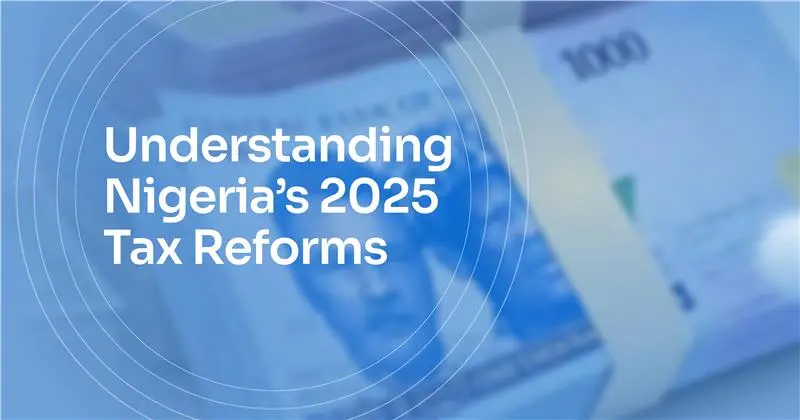You’ve likely seen the headlines about Nigeria’s new tax reform laws, signed in June 2025—one of the most far-reaching overhauls of the country’s tax system in recent history.
But these reforms go beyond policy updates tucked away in government documents. They introduce a new reality for businesses, employees, and how organisations in Nigeria must manage payroll, benefits, and compliance.
If you’re an HR leader or a member of the executive team, here’s what you need to know, and how these changes could shape your workforce strategy going forward.
The Four New Laws
Nigeria’s 2025 tax reform introduced four distinct but interlinked pieces of legislation, each designed to modernise and simplify the country’s tax framework. Here’s what they mean for your organisation:
1. Nigeria Tax Act
The Nigeria Tax Act consolidates and streamlines the country’s major tax provisions, including personal income tax, corporate tax, value-added tax (VAT), and capital gains tax, into a unified legal framework. This reduces complexity and duplication, making it easy for businesses to comply.
For HR and finance leaders, this simplifies compliance by removing conflicting interpretations across different laws and making it easier to align internal processes with a single, updated reference point.
2. Nigeria Tax Administration Act
The Nigeria Tax Administration Act law brings greater consistency to how taxes are collected and enforced across federal, state, and local governments. It eliminates overlapping roles and reduces bureaucratic complexity.
For organisations operating in multiple states across Nigeria, this offers clarity and reduces administrative friction when managing multi-location payroll or employee tax compliance.
3. Nigeria Revenue Service Act
The Nigeria Revenue Service Act officially transforms the Federal Inland Revenue Service (FIRS) into the Nigeria Revenue Service (NRS), a more autonomous, digitally enabled body with expanded authority to enforce tax compliance.
The NRS is expected to lead a shift toward data-driven tax administration, using digital tools for real-time reporting, audits, and enforcement. For businesses, this means less room for error and stronger expectations for accuracy in payroll and tax filings.
4. Joint Revenue Board Act
The Joint Revenue Board Act enhances collaboration and information-sharing between different government levels and introduces a Tax Ombudsman and Tax Appeal Tribunal to handle disputes fairly.
For businesses, this means more coordinated oversight, fewer contradictory directives, and a more transparent dispute resolution process when issues arise across jurisdictions.
What Are the Effects of These New Tax Laws?
With the 2025 tax reforms taking effect by January 2026, it’s crucial for businesses to understand how these changes will influence their operations. Here’s a breakdown of the key effects.
1. Personal Income Tax Revision Threshold
What changed:
According to PwC Nigeria, the 2025 tax reforms bring significant relief for individuals. Those with annual taxable income of ₦800,000 or below are now fully exempt from personal income tax.
The reforms also introduce a new Rent Relief, which allows individuals to claim 20% of their annual rent paid, up to a maximum of ₦500,000 (whichever is lower). To qualify, individuals must declare their rent payment to the tax authority and obtain clearance before the relief is applied.
Additionally, compensation for loss of employment is now tax-exempt up to ₦50 million.
Implication for HR:
- You’ll need to adjust your payroll process to accommodate new tax thresholds and exemptions.
- Employee net pay will shift across all income levels. Communicating this clearly will be key to managing expectations.
- Benefits like rent support or allowances may now play a bigger role in compensation planning.
2. Exemptions for Small Business
What changed:
Small businesses with annual turnover under ₦100 million and assets under ₦250 million are now exempt from Company Income Tax (CIT) and Capital Gains Tax (CGT).
In contrast, large companies will now pay 30% Capital Gains Tax, up from the previous 10%.
Implication for HR:
- If your business qualifies as a small company, this exemption frees up cash flow, allowing more room to invest in employee benefits, training, and strategic recruitment. It also presents an opportunity to improve workforce retention and growth initiatives.
- HR must work closely with Finance to confirm eligibility and reallocate tax savings toward talent development and operational efficiency. For larger organisations, the increased CGT should prompt a review of employee equity plans, stock options, and exit strategies to ensure tax-efficient compensation.
3. Zero-Rated VAT on Essentials
What changed:
While VAT remains at 7.5%, sellers of essential items and services like food, healthcare, education, and residential rent will no longer have to charge a Value Added Tax (VAT).
Implication for HR:
- If your business offers housing, feeding, or healthcare as part of benefits, this could influence how those perks are valued.
- Procurement decisions for employee welfare programs should now consider VAT-exempt items to optimise spend.
4. Corporate Income Tax (CIT) For Large Businesses
What changed:
Currently, CIT remains at 30% for large businesses. Although initial drafts of the Tax Reform Acts proposed reductions to 27.5% in 2025 and 25% from 2026, those provisions were removed. Any future reduction would require separate legislation.
Implication for HR & Executive Teams:
- This impacts business sale strategies, stock options, and employee share incentive plans.
- HR leaders managing equity-based compensation (especially in tech/startups) must revisit plan structures to ensure tax efficiency.
5. Introduction of the 4% Development Levy
Companies (except small businesses) must now pay a 4% Development Levy on assessable profits. This replaces multiple levies including TET, IT Levy, NASENI, and Police Trust Fund contributions.
Implication for HR:
- The additional levy may influence workforce cost planning.
- Salary structures, benefits, and annual compensation reviews will need adjustments to accommodate the updated tax obligations.
6. Mandatory E-Invoicing and VAT Fiscalisation
The Federal Government has also introduced mandatory e-invoicing and VAT fiscalisation to improve digital tax compliance.
Implication for HR:
- HR and payroll documentation will be subject to more real-time scrutiny.
- Internal processes must align with digital reporting and record-keeping standards to avoid compliance gaps.
7. Stricter Penalties for Non-Compliance
Non-compliance penalties have increased significantly, including:
- ₦100,000 fine for late filing in the first month
- ₦50,000 for each additional month
- A penalty of ₦5 million now applies to any organisation that awards a contract to a vendor who is not properly registered for tax.
Implication for HR:
- Staff records, payroll data, and vendor information must be accurate and up to date.
- HR will need to reinforce employee verification, tax documentation, and vendor checks to prevent penalties tied to inaccurate filings or onboarding practices.
8. Minimum Effective Tax Rate for Large Organisations
Nigerian companies that are part of a multinational group with a combined global turnover of EUR 750 million or more, or companies in Nigeria with annual turnover of ₦50 billion and above, will now be subject to a minimum effective tax rate (ETR) of 15% of their net income.
Implication for HR & Executive Teams:
- For large organisations that fall within this turnover threshold, this may influence how profit-linked bonuses, long-term incentives, and equity-based compensation are structured.
- HR teams will need to review reward frameworks that depend on company profitability to ensure they remain viable under a higher minimum effective tax burden.
9. Capital Gains Tax on Indirect Transfer of Shares
The Nigeria Tax Act (NTA) now applies Capital Gains Tax (CGT) to indirect transfers of shares in Nigerian companies. This means that if shares are sold through an offshore holding company, Nigerian CGT may still apply (subject to any treaty exemptions). The exemption threshold for share sales has also increased to ₦150 million within any 12-month period, provided the gains do not exceed ₦10 million.
Implication for HR & Executive Teams:
- Organisations that offer share-based compensation or operate through group structures will need to review how equity awards, stock options, and exit arrangements are designed.
- The updated threshold and the new treatment of indirect transfers will affect employee liquidity events and the tax profile of equity-linked benefits.
Why Were These Reforms Implemented?
According to the statement released by the Federal Government of Nigeria, these reforms were a deliberate response to structural, economic, and administrative challenges.
- The 2025 tax reforms were introduced to address Nigeria’s historically low tax-to-GDP ratio—just over 10% compared to the African average of 16–18%—by expanding the tax base without overburdening low-income earners or small businesses.
- The tax reforms aim to simplify Nigeria’s fragmented and overlapping tax structure through unified laws and streamlined administration, making compliance easier for businesses and individuals.
- The reforms also embrace digital transformation, equipping the newly formed Nigeria Revenue Service with modern tools for transparency, data-driven enforcement, and e-filing.
Above all, the reforms promote equity by offering relief to vulnerable populations, supporting small businesses, and ensuring that high-income earners and large corporations contribute more fairly—laying the groundwork for sustainable revenue, economic inclusion, and renewed investor confidence.
When Will These Changes Apply?
Although signed in June, 2025, these reforms will take effect from January 1, 2026, to allow time for implementation, system redesign, and public awareness campaigns
How SeamlessHR Has Integrated the 2025 Tax Reforms
At SeamlessHR, we have already reviewed the 2025 tax reforms and updated our payroll system to align fully with the new requirements ahead of the January 2026 effective date.
All tax reform updates are now available within the SeamlessHR Payroll platform. Once the reforms legally take effect on 1 January 2026, organisations simply need to toggle on the new tax settings to activate them for their payroll cycles.
With SeamlessHR Payroll, organisations can stay ahead—reducing errors, simplifying tax remittance, and giving employees full visibility into how the reforms affect their take-home pay.






